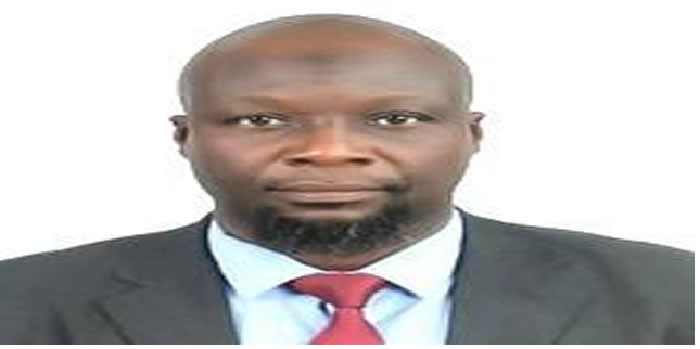From F9 parallel in WASSCE to first class in OAU, UNILAG don shares…
Dr Adewale Tiamiyu, a lecturer in the Department of European Languages and Integration Studies at the University of Lagos, shares his remarkable educational journey from humble beginnings to academic success in this interview with IMOLEAYO OYEDEYI

How did you feel when you had an ‘F9 parallel’ in your O’level exam?
That was in 1987. I felt it was over and it was not possible to go back to school. But I still tried. At that time, it was my social life that affected me. I used to be a break dancer. I also marched for my school: Adelagun Memorial Grammar School in Ibadan, Oyo State. But at the end of it all, I went to check my result and it was F9 parallel. So I lost hope. Though I later sat for the GCE exam, it wasn’t successful, because I did not have the English language. I tried the examination twice and I had E8 in the language. So I abandoned education in 1990. Between 1990 to 1995, I was in Cote d’Ivoire as a meat seller. So I travelled out of the country. However, I returned in 1995 to Lagos and registered for GCE lessons. At the same time, I worked as a primary school teacher in Surulere. So I prepared to go back to school between 1995 and 1997. I made my GCE in 1996 and got admitted into Obafemi Awolowo University, Ile Ife in 1997.
However, was it only the break dancing and extracurricular activities that made you fail the ‘level examinations?
No. That was not the only issue. Then, I was too social and had about 18 girlfriends in almost all Ibadan schools. In those days, we always went to different schools for inter-house sports and I would want to have at least one girlfriend in any school we visited. I am talking of the 80s now. So, I think it was my social life. It was later in life that I understood that I was not a dullard since I had a First Class in OAU years later. I used to think I was a dullard, but my academic achievement in Ife made me believe I was not. I was just not serious during my secondary school days.
What was the reaction of your parents to your O’level result at that time, did they also give up on your education?
They were disappointed that I had an F9 parallel in my O’level. But when I did GCE in 1988, I had credits in four subjects, excluding English. So I did GCE again and kept on having E. So I tried, but I couldn’t make the full five credits. And I never wanted to go to a polytechnic anyway. Assuming I wanted to do that, I could have combined my results. But I never wanted to go. I remember that after my first attempt, it was one of my girlfriends who taught me Mathematics, which made me pass the subject in the second examination, GCE. But I never had credits in English. And when I couldn’t get admission to the university, I wasn’t comfortable in my area anymore. So, I had to travel out of the country.
But why Cote D’IVoire?
I wanted to go to the United States from a French country. This was because most of my mates who didn’t make their results back then had travelled to Holland and other foreign countries just to take away that shame of not passing O’level. You know we were big guys in those days. And all our girlfriends had all gone to the universities because they made their results. So psychologically we were disturbed. We just felt the only option available for us was to go abroad and look for money. So that was why we travelled out. I had intended to go to the USA from Cote d’Ivoire. But when I got to Abidjan, I was disappointed with what I saw. I regretted travelling out. And even now, the phobia is still in me as I don’t want to travel out. Even if they are calling me in the same USA now, I already have that phobia that I don’t want to go and suffer anywhere in the world.
Do you know where some of the bright students in your secondary days are right now?
One of them is in my Faculty. We are both lecturing there. Though he is my senior now at the university, he used to be my classmate in secondary school. He went to the University of Ibadan and graduated in 1993. But I got admitted in 1997. However, having a First Class in Ife made it easy for me to start my lecturing career immediately as I was retained as a lecturer in my department between 2003 and 2005. So I think my First Class made up for the F9 issues I had in my secondary school. And now, I am even much more educated than some of those who came out with better results during my O’level days. I am a Ph.D holder now. But some of them don’t have a PhD. Each time they see me, they wonder how I made it. But I always say, it is never over until it is over. Life is a race anyway. This means if you are still alive, you can become anything. I am a goal-getter and I don’t think anything is possible.
What about your other friends who had the same poor O’level results at the time like you, where are they now and is there anyone among them who was able to overcome that setback?
None were able to overcome that setback of poor O’level results. There is even one at the University of Lagos where I work currently. He is a bricklayer. He never furthered his education after that experience. He is doing the bricklaying job at the university. In my set at the secondary school, we were about 600. And three of us from the same secondary school and class currently work in UNILAG. One is an Associate Professor. I am a lecturer and the third man is a bricklayer. The first man is my senior because I couldn’t catch up with those who had gone ahead of me. But the third person is still a bricklayer as we speak here in UNILAG. Though we still talk, he is not always comfortable around me, because he is not happy seeing me as a Dr, while he is a bricklayer. But I wanted to encourage him because I don’t believe anything is possible. I believe that if he can dream it, it is possible. I could remember that when I was doing my master’s programme at UNILAG. I used to trek from Ikotun to the university. I trekked more than 20 times to go for my studies that year. So I am the type that doesn’t give up on something.
What do you think often goes on in the mind of your secondary school classmate who is now a bricklayer each time he sees you?
Well, I think one of them will be the age factor. I am 54 years old now. But when I made my decision to go back to school in 1995, I was 26 years of age. I left Cote d’Ivoire as a meat seller with the determination to go back to school. So I decided at the right time and I got admission at the age of 29. I eventually graduated at the age of 32. So it was still possible for me to catch up with those who had gone far ahead of me. But if you tell my secondary school classmate who is now a bricklayer to go back to school now that he is also over 50 years of age, he won’t want to do that. This is because he is married with children now. It is too late now for him unless his children will send him to school. I remembered the story of a woman who got admission at the age of 64 to OAU to study law and she graduated at the age of 70. So it is not over until it is over. Life is just like a football match, once the referee has not blown the whistle, you can’t say this is who will win the match.
You went to Cote d’Ivoire intending to travel to the United States from there, so, how did you end up as a meat seller in that country?
When I got there, they asked me if I had an O’level result. I said I didn’t have one. They said that hadn’t been that I had an O’level result, I would have been employed to teach English in the primary school. It was at that time I learnt that if you went to secondary school and didn’t have an O’level result, you remained illiterate. For me, it was very difficult to get abroad from the French country especially when I had no evidence that I attended a secondary school. So the people in Abidjan then asked me which handwork I learnt. Then, I told them I didn’t learn any work. So that was why they got me a meat-selling job. I would go around the market with the meat in my tray to sell to people. That was in the Northern part of Cote d’Ivoire. Initially, I didn’t want to do it. But my maternal uncle, whom I stayed with, stopped feeding me at some point. He said he couldn’t be feeding someone that was not ready to work. So I had to accept the job.
But when you got to Ivory Coast and got disappointed, why didn’t you return to Nigeria?
It was not possible to return because I had no fares to do that. So I had to work. More so, before leaving Nigeria, I had promised my girlfriend that I would come back to take her to the United States. So that shame of failing to make it to the United States caught me. That was why I decided to stay back in the French country to work and gather money. I invested the money in the business of selling rice, potatoes, and onions but the business collapsed. So I had to come back to Nigeria in 1995 to pursue education. I took that decision because I discovered that if one does not go to school or has money, one can’t belong to any serious class in society. And since I had pursued money and couldn’t get it, I felt the only way left for me to have class in life was to go back to school. That was why I got back and started reading the Oxford English textbook for primary four, five, and six classes. I also read a lot in Cote d’Ivoire and that allowed me to master all the basics that I lost in the English language.
How correct is the claim that you once worked as a Septic tank evacuator?
That was when I returned to Lagos from Cote d’Ivoire. When I came back to Nigeria in 1995, I stayed with my uncle in the Aguda area in Surulere, Lagos. And evacuating septic tanks is what my uncle did then for a living. So one day, I asked him to give me money to buy books for my GCE lessons and he told me that I had to join him in the work. I said I was not interested. He then said he couldn’t give me any money if I was not ready to join him to do the work. That was why I agreed to do the work with him. But whenever we got any job then, he would give me only £1 out of the £10 he charged. Yet, I was the one that would enter the septic tank. But I still managed to do it for two years before I got admission in 1997. It was the money I made during those two years that I used to buy the books I needed for my pre-university education preparations. As God would have it, I eventually got admission to OAU to study the French-German language.
culled from PUNCHNG





 celebrity radar - gossips5 months ago
celebrity radar - gossips5 months ago
 celebrity radar - gossips5 months ago
celebrity radar - gossips5 months ago
 Business4 months ago
Business4 months ago
 Business4 months ago
Business4 months ago






